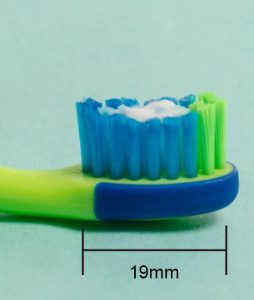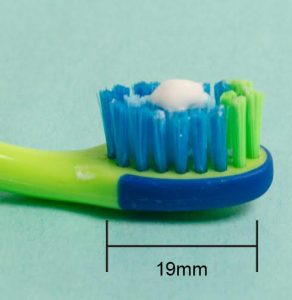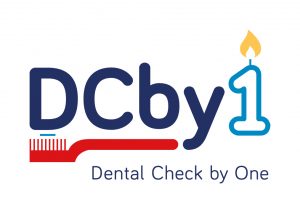Encourage your child to brush their teeth twice a day, morning and evening. The last thing on your child’s teeth at bedtime should be fluoride toothpaste.
Don’t brush straight after sugary treats – including drinks such as fizzy drinks or fruit juice. The acid created as a result of eating sugar softens the enamel. Wait half an hour and then brush.
Encourage them to spit out excess toothpaste, but not to rinse. Rinsing with water after tooth brushing will wash away the fluoride and make it less effective.
Supervise tooth brushing – or do it yourself – until your child is at least seven years old, even older if necessary.
Make tooth brushing as fun as possible by using an egg timer to time it for about two minutes – or find a fun app, like BrushDJ.
Saliva plays a key role in helping keep teeth protected from decay as it has a pH of 7.1. As saliva production is reduced at night-time it’s important to avoid anything other than water in the hour before bed.
Change the brush regularly – especially when the bristles start to curve or look worn out.
Don’t let children run around with a toothbrush in their mouth, as they may have an accident and hurt themselves.
Make sure children don’t eat or lick toothpaste from the tube.
Smear (Photo courtesy of Public Health England)

Blob (Photo courtesy of Public Health England)

In the UK, you can register for free with an NHS dentist. He or she will recommend appointment intervals. Dental care is free for children up to the age of 18 (or up to 19 if in full-time education).
Every child should have fluoride varnish painted on their teeth twice a year from the age of two or 4 times a year if they are at high risk of dental decay. Once permanent molars come through, from the age of about 6 or 7, fissure sealants can be placed on chewing surfaces to help protect them from decay. Sealants should be applied as soon as the molar teeth come through if the child has had decay in their first teeth. If there is decay in a permanent molar, then fissure sealants should be placed on all other permanent molar teeth.
It’s important for your child to be independent, but if they’re not cleaning their teeth properly, you’ll need to step in. You can teach them independence with other activities.
If your child is resistant to you cleaning his teeth you could negotiate a situation where they are allowed to do the first clean (or the last clean) and you get to clean as well for around 2 minutes.
Be really gentle as it can be very uncomfortable having someone else clean your teeth.
You can use toothbrushes that light up for 2 minutes, or a fun app like BrushDJ (which is recommended by the NHS and free) or an egg timer to help your child to see how long to clean his teeth. These help motivate and distract the reluctant tooth-brusher.

